Table of Contents
Get started with MyPerfectResume today!
- Build a resume on any device
- Pick an ATS-friendly template
- Tailor with AI copy suggestions
Why this resume works
- Quantifies accomplishments: By managing budgets exceeding $5M and implementing tax strategies saving $250k annually, the applicant effectively quantifies accomplishments to demonstrate their impact.
- Highlights industry-specific skills: The resume highlights industry-specific skills such as financial analysis and audit support, aligning with essential administrative skills for the finance sector.
- Showcases career progression: Progressing from accounting specialist to staff accountant illustrates a clear trajectory of increasing responsibility and expertise in managing complex financial tasks.
More Staff Accountant Resume Examples
Explore our staff accountant resume examples to see how to effectively showcase your accounting skills and experience. These accounting resume samples and tips will help you craft a resume that highlights your financial expertise and attention to detail.
Entry-Level Staff Accountant
Why this resume works
- Effective use of keywords: By incorporating role-specific terms like “financial reporting” and “budget management,” the applicant’s resume accounts for keywords to get past ATS filters.
- Centers on academic background: Highlighting academic honors, such as graduating from the University of New York with a master’s degree, highlights the applicant’s early career achievements.
- Shows digital literacy: Listing tools like accounting software and data analysis, the applicant showcases their computer skills, proving readiness for tech-driven environments.
Mid-Level Staff Accountant
Why this resume works
- Points to measurable outcomes: By emphasizing outcomes like boosting audit compliance by 13% and cutting reporting errors by 20%, the applicant effectively conveys a results-driven approach to financial management.
- Demonstrates language abilities: Abilities in Spanish, alongside intermediate French and basic German, highlight strong language skills, indicating the candidate’s ability to foster effective communication across diverse cultural and professional contexts.
- Displays technical expertise: Expertise in tools like SAP, QuickBooks, and Microsoft Excel showcases the applicant’s ability to handle complex financial systems with precision and adaptability.
Experienced Staff Accountant
Why this resume works
- Lists relevant certifications: Listing certifications like CPA and CMA on the resume reflects a strong foundation in accounting and ongoing dedication to professional development.
- Showcases impressive accomplishments: The applicant’s ability to optimize audit timelines by 25% and streamline billing processes showcases impressive accomplishments, indicating significant contributions to operational efficiency.
- Emphasizes leadership skills: Experience in managing a $4M budget and leading audit process enhancements demonstrates effective leadership skills through strategic decision-making and team guidance.
Staff Accountant Resume Template (Text Version)
Ming Garcia
Detroit, MI 48209
(555)555-5555
Ming.Garcia@example.com
Professional Summary
Experienced in fiscal management and strategic tax planning with a keen ability to optimize budgets and reduce discrepancies, I offer skills in financial analysis and investment strategy enhancement.
Work History
Staff Accountant
Fiscal Matters Inc. – Detroit, MI
June 2022 – June 2025
- Managed budgets exceeding M efficiently.
- Reduced discrepancies by 30% through audits.
- Implemented tax strategies saving 0k annually.
Financial Analyst
Peak Financial Solutions – Detroit, MI
June 2019 – May 2022
- Optimized investment strategies by 40%.
- Analyzed market trends improving revenue.
- Forecasted budget reducing costs by 0k.
Accounting Specialist
Greenfield Accounting Services – Southgate, MI
June 2017 – May 2019
- Reconciled financial records enhancing accuracy.
- Supported audits decreasing errors by 50%.
- Processed transactions over M monthly.
Certifications
- Certified Public Accountant – American Institute of CPAs
- Certified Management Accountant – Institute of Management Accountants
- Chartered Financial Analyst – CFA Institute
Education
Master of Business Administration Accounting
University of Colorado Boulder Boulder, Colorado
May 2017
Bachelor of Science Finance
Colorado State University Fort Collins, Colorado
May 2015
Languages
- Spanish – Bilingual or Proficient (C2)
- French – Beginner (A1)
- Mandarin – Intermediate (B1)
Skills
- Financial Analysis
- Budget Management
- Tax Optimization
- Audit Support
- Data Reconciliation
- Cost Reduction
- Investment Strategy
- Market Trend Analysis
Related Resume Guides
Advice for Writing Your Staff Accountant Resume
Explore our advice on how to write a resume for a staff accountant role and discover ways to highlight your accounting skills and attention to detail. Tailor your resume with tips that speak directly to the demands of the accounting world and make your expertise stand out.
Highlight your most relevant skills
Listing relevant skills when applying for a job like staff accountant is important because it shows employers you have the abilities needed to do the work well. A dedicated skills section helps highlight these abilities at a glance, making it easy for hiring managers to see that you’re a good fit.
Balance technical skills, like financial analysis and accounting software knowledge, with soft skills, such as communication and teamwork. This mix shows you can handle both the numbers and work well with others.
To make your resume even stronger, try weaving key skills into your work experience section. For example, instead of just listing duties at your past jobs, mention how you used certain skills to succeed in those roles.
Saying something like “used Excel to streamline monthly reports” or “collaborated with teams to ensure timely completion of audits” demonstrates how your skills come into play in real scenarios. This approach not only tells but also shows potential employers what you can bring to their team as a staff accountant.
Selecting a resume format that emphasizes your analytical skills, attention to detail, and financial software skills can distinguish you as a staff accountant.
Showcase your accomplishments
To effectively showcase your accomplishments as a staff accountant, organize your work experience in reverse chronological order. Start with your most recent job and work backward. For each position, include the job title, employer name, location, and employment dates. This format helps hiring managers quickly see your career progression and most recent achievements.
Instead of just listing responsibilities, focus on quantifying your accomplishments. Turn duties into achievements by highlighting measurable results such as percentages, time savings, cost reductions, or efficiency improvements. For example, instead of saying you “managed accounts,” say you “reduced errors in account management by 15% through improved reconciliation processes.”
Using action-oriented words like “improved,” “increased,” or “developed” can make your resume more engaging and impactful. Quantified accomplishments allow hiring managers to quickly assess your impact and skills.
They show how you’ve contributed to previous employers’ success and suggest what you might bring to a new role. By focusing on measurable achievements related to core accounting tasks, you demonstrate not only what you’ve done but also the value you’ve added in each position.
5 staff accountant work history bullet points
- Prepared monthly financial statements and reconciled accounts, ensuring 98% accuracy in reports.
- Managed accounts payable and receivable processes, reducing overdue invoices by 25%.
- Implemented a new expense tracking system, saving the company $10,000 annually.
- Collaborated with auditors to complete annual audits 15% faster than in previous years.
- Analyzed budgeting trends and provided recommendations that increased cost efficiency by 20%.
Opt for a resume template that is simple and neat, with clear sections and easy-to-read fonts to help hiring managers quickly spot your skills and experience.
Write a strong professional summary
A professional summary is a section at the top of your resume that typically includes three to four sentences showcasing your experience, skills, and achievements. It’s best for experienced applicants who have several accomplishments to highlight. This section’s purpose is to show your professional identity and the value you bring to roles like staff accountant.
When creating a resume, you can choose between a professional summary and a resume objective. A resume objective is all about your career goals. It’s better suited for entry-level candidates, those changing careers, or people with employment gaps. Unlike summaries that focus on “what I’ve accomplished,” objectives emphasize “what I aim to contribute.”
Now that we’ve explored these two options, let’s look at some examples tailored for different industries and levels of experience. Browse our resume examples for additional inspiration.
Staff accountant resume summary examples
Entry-level
Recent accounting graduate with a Bachelor of Science in Accounting from XYZ University. Completed an internship at ABC Company, where tasks included assisting with financial reporting, reconciliations, and audit preparation. Certified in QuickBooks and proficient in Microsoft Excel. Eager to apply foundational skills in a staff accountant role and contribute to financial accuracy and efficiency.
Mid-career
Experienced staff accountant with over five years of experience in handling general ledger entries, payroll management, and tax filings within the manufacturing industry. Recognized for improving month-end closing processes and reducing discrepancies through diligent review practices. Holds a CPA license and excels in using ERP systems like SAP and Oracle. Known for strong analytical skills and attention to detail.
Experienced
Seasoned staff accountant with 10+ years of expertise in financial analysis, budget planning, and compliance audits across multiple sectors, including healthcare and finance. Proven track record of leading audit teams to successful outcomes and implementing cost-saving initiatives that resulted in significant annual savings. Advanced skills in GAAP standards, forensic accounting techniques, and team leadership. Committed to driving financial integrity and mentoring junior accountants.
Staff accountant resume objective examples
Entry-level applicant
Driven entry-level accountant with a bachelor’s degree in accounting eager to apply foundational knowledge and analytical skills in a challenging staff accountant role. Committed to contributing to financial operations and supporting the team in achieving accurate reporting and compliance goals.
Career changer
Detail-oriented professional transitioning from retail management into accounting, equipped with strong organizational skills and a keen eye for detail. Ready to leverage experience in budgeting and inventory control to excel as a staff accountant, ensuring precise financial records and efficient workflows.
Recent graduate
Ambitious recent graduate with an internship background in auditing seeking a staff accountant position. Enthusiastic about applying academic learning and practical experience to assist in maintaining accurate financial statements and improving the efficiency of accounting processes within a dynamic organization.
Quickly create a professional resume! Our Resume Builder helps you highlight your accounting skills and experience in the best way possible.
Match your resume to the job description
Tailoring your resume to the job description helps you stand out to employers and pass through applicant tracking systems (ATS). Many companies use ATS to sift through the numerous applications they receive. These systems scan resumes for specific keywords from job postings, making it essential to customize your resume for each position.
An ATS-friendly resume incorporates keywords from the job description that align with your skills. This boosts the chance of hiring managers noticing your application. By matching your experience with what employers seek, you heighten the likelihood of getting called for an interview.
To pinpoint keywords from job postings, carefully read the description and note any skills, qualifications, or duties mentioned multiple times. For example, if you’re applying for a staff accountant role and spot terms like “financial reporting,” “account reconciliation,” or “budget management” repeated often, these are key phrases to include in your resume.
Integrate these terms naturally into your resume by rephrasing past job experiences. For instance, instead of saying “Handled company finances,” you could say “Managed financial reporting and account reconciliation.” This not only highlights relevant skills but also mirrors the language used in the job posting.
Using targeted resumes tailored to specific roles ensures they’re more compatible with ATS. It helps both computers and hiring managers quickly recognize you as a strong applicant for the position.
Want to boost your resume’s chances of getting noticed? Our ATS Resume Checker reviews important details and helps you improve your score right away.
FAQ
Do I need to include a cover letter with my staff accountant resume?
Yes, adding a cover letter with your staff accountant resume can boost your application and help you stand out from others. It allows you to highlight your interest in the company and show how your skills match their needs, like skill in accounting software or familiarity with financial regulations.
Additionally, if the firm specializes in areas like forensic accounting or tax services, you can emphasize any relevant experience or passion for those fields. Consider using our Cover Letter Generator to easily create a personalized cover letter based on your resume details and specific job requirements.
Exploring cover letter examples tailored to accounting roles can provide valuable insights into structuring and content strategies that resonate with employers.
How long should a staff accountant’s resume be?
For a staff accountant, aim for a one-page resume that effectively highlights your key skills and experiences. Focus on showcasing your skill with accounting software, attention to detail, and ability to manage financial records accurately.
If you have extensive experience or specialized certifications in areas like tax preparation or auditing, extending to a two-page resume can be appropriate.
Make sure every detail is relevant and tailored to the position you’re applying for. Highlight recent roles and achievements that demonstrate your expertise in accounting tasks.
Explore our guide on how long a resume should be for examples and tips tailored to your career stage.
How do you write a staff accountant resume with no experience?
If you lack direct accounting experience, emphasize your education, skills, and any relevant training or projects on your staff accountant resume to present yourself as a strong applicant. Check out these tips on writing a resume with no experience:
- Highlight your education: Begin with your degree in accounting or finance. Include the name of your institution, graduation date, and any honors or relevant coursework like tax accounting, financial reporting, or auditing.
- Showcase internships and volunteer work: If you’ve completed internships or volunteered in roles involving financial tasks, describe these experiences. Focus on duties like bookkeeping, budgeting assistance, or financial data analysis.
- Emphasize transferable skills: Highlight skills such as skills in Excel and accounting software (like QuickBooks), attention to detail, analytical thinking, and problem-solving abilities. These are important for a staff accountant role.
Tailor each section of your resume to reflect the job description’s requirements. This approach can demonstrate your potential despite limited experience.
Rate this article
Staff Accountant
Share this page
Additional Resources
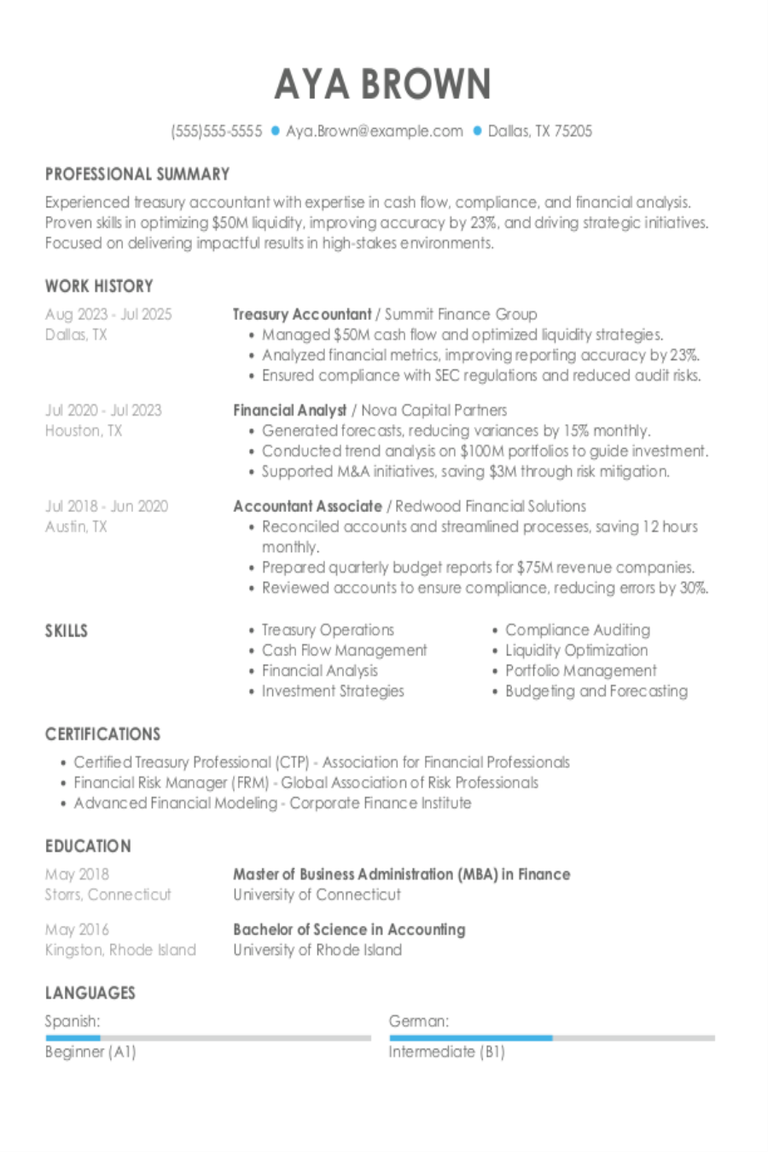
Treasury Accountant Resume Examples & Templates
Explore treasury accountant resume examples and learn how to show you handle cash flow, manage investments, and analyze financial data.Build my resumeImport existing resumeCustomize this templateWhy this resume worksQuantifies accomplishments: By
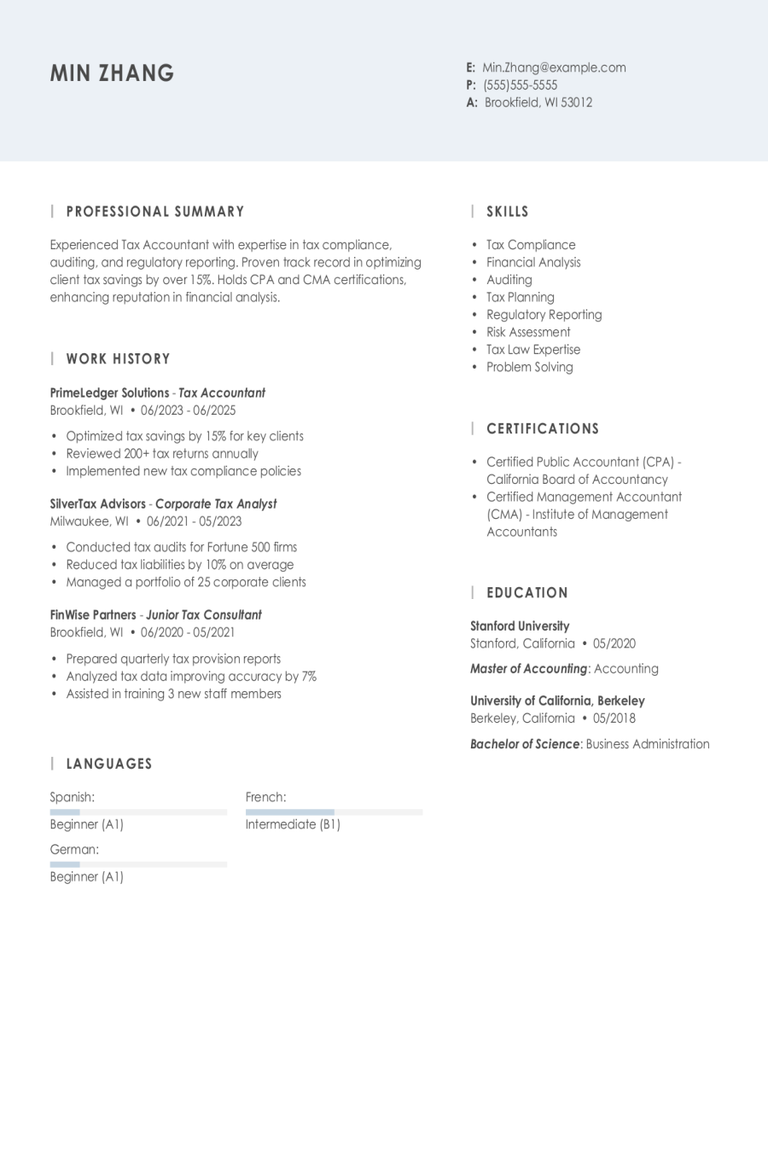
Tax Accountant Resume Examples & Templates
Explore tax accountant resume examples and tips to learn how to highlight your financial skills and tax expertise to stand out to potential employers in the accounting field.Build my resumeImport
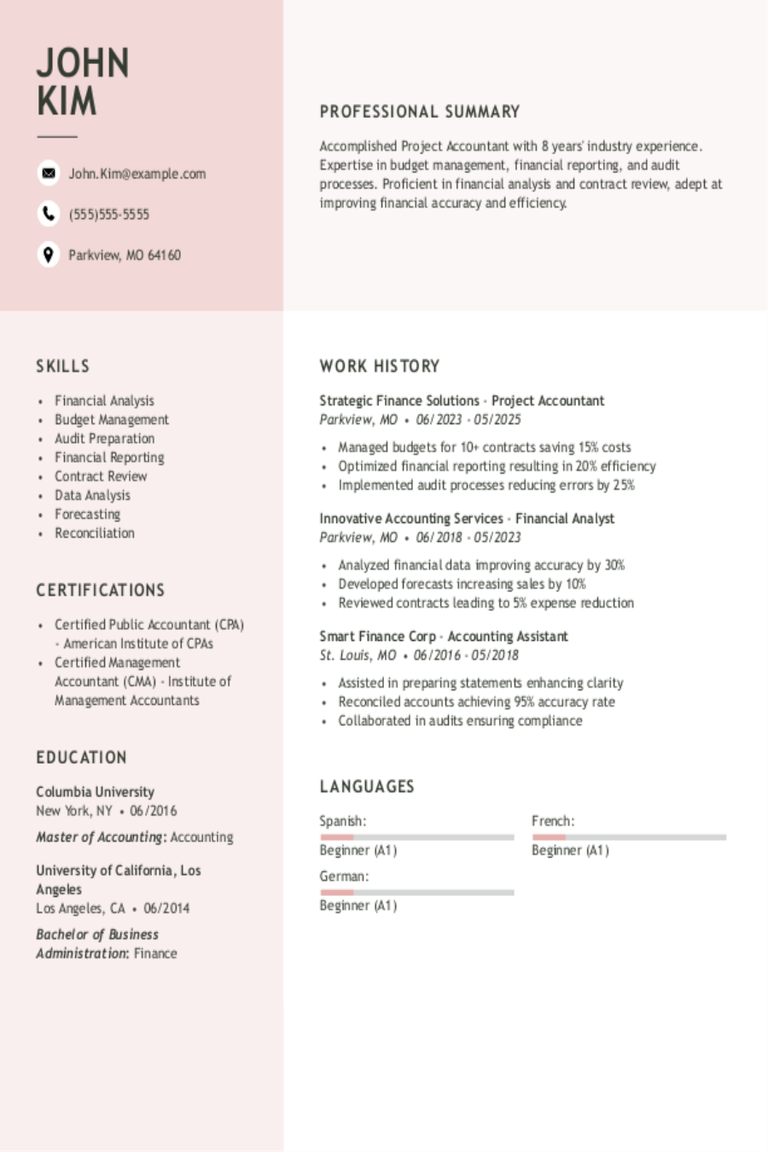
Project Accountant Resume Examples & Templates
Explore project accountant resume examples and tips to learn how to highlight your experience managing budgets and tracking financial progress.Build my resumeImport existing resumeCustomize this templateWhy this resume worksQuantifies
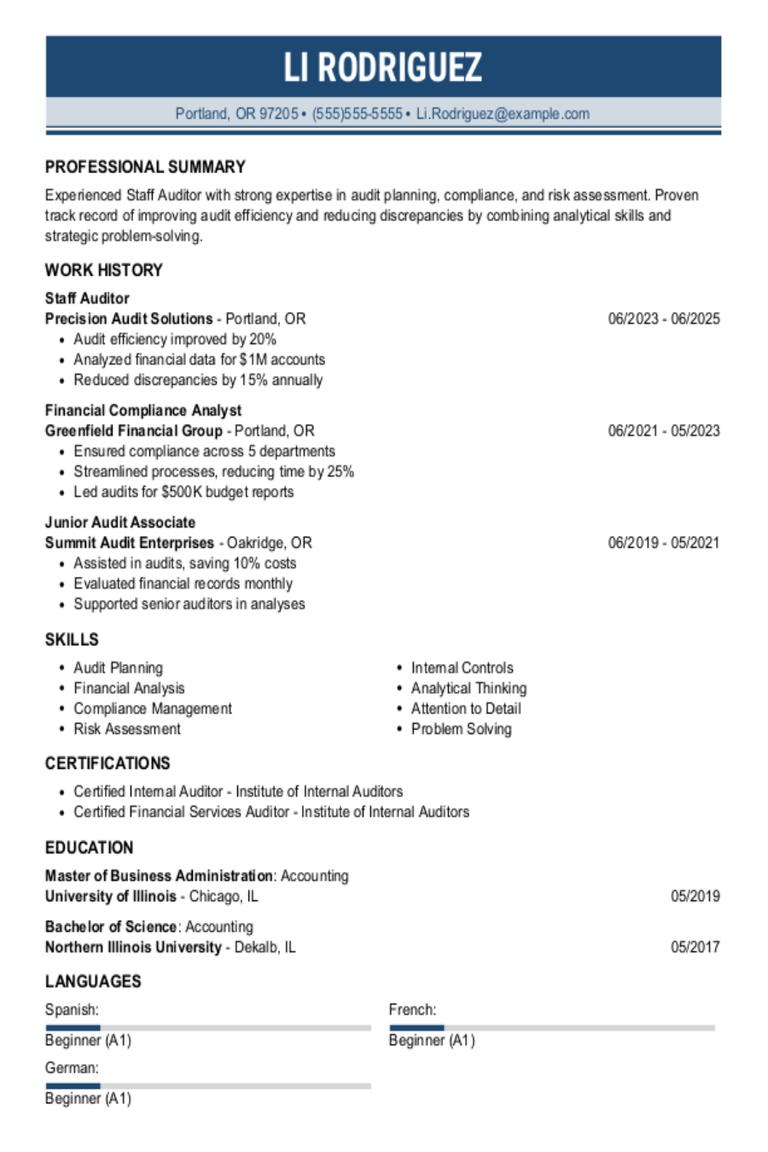
Staff Auditor Resume Examples & Templates
Explore staff auditor resume examples and guidance to learn how to effectively highlight your attention to detail and experience in auditing.Build my resumeImport existing resumeCustomize this templateWhy this resume worksQuantifies
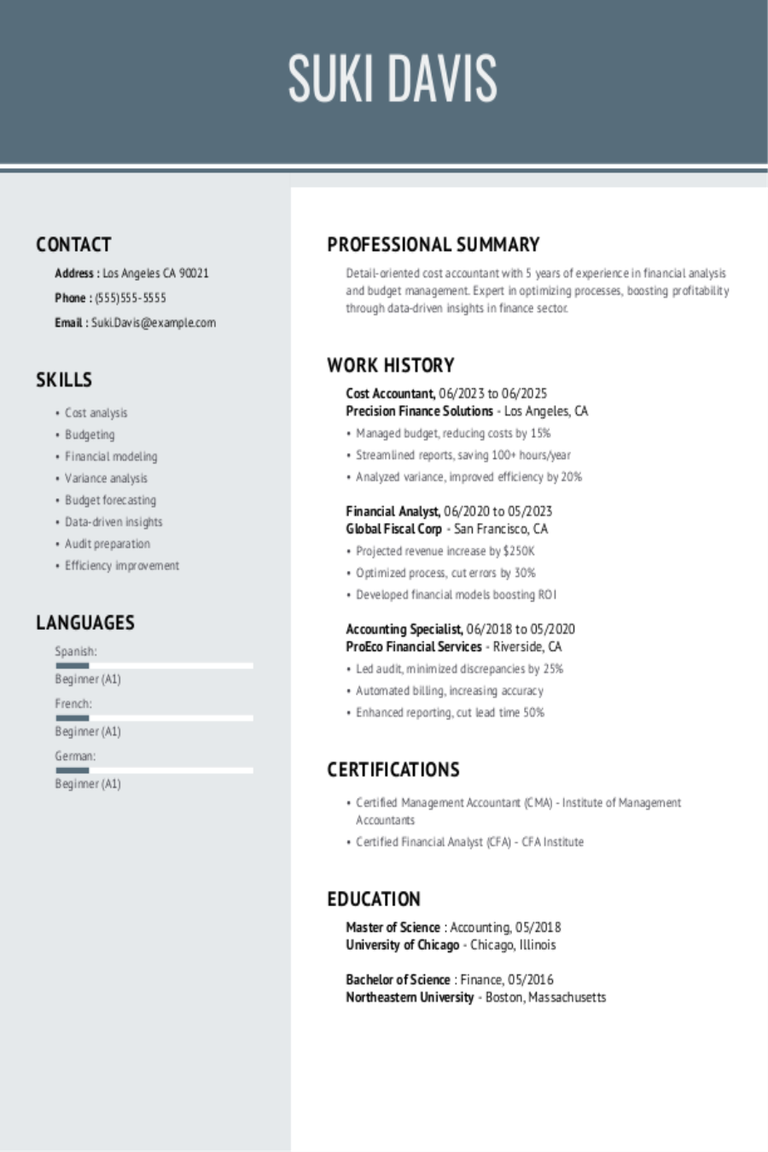
Cost Accountant Resume Examples & Templates
Explore cost accountant resume examples that focus on managing budgets and tracking expenses. Our tips will help you highlight your financial skills and show off your experience in handling company
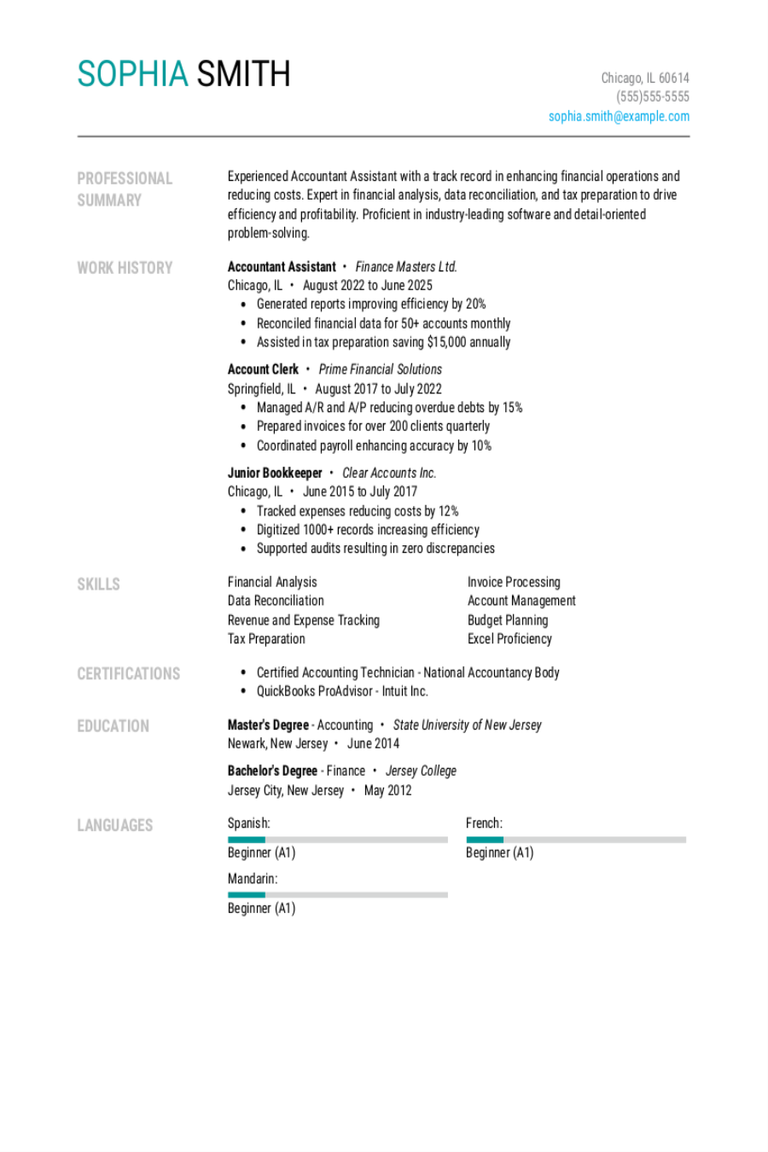
Accountant Assistant Resume Examples & Templates
Explore accountant assistant resume examples that focus on number skills, organizing documents, and helping with reports. Discover how to show you’re detail-oriented, good with numbers, and ready to support the
